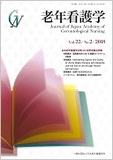Japanese
English
- 販売していません
- Abstract 文献概要
- 参考文献 Reference
抄録
本研究の目的は,認知症高齢者の胃ろう造設を代理意思決定した家族が,造設から看取り後まで,胃ろうに対してどのような心理的変化をたどるのかを明らかにすることである.胃ろう造設を決定し,看取りまでを経験した家族7人を対象に,半構成面接法を実施し修正版グラウンデッド・セオリーを用いて分析した.家族は,造設時,胃ろうは<ひとつの食形態>であり<胃ろうにするのは自然なこと>と【延命ではなく自然な経過】としてとらえていた.しかし,被介護者や家族自身の心身の変化が生じるなかで,<胃ろうによって生かされている命を実感>するとともに,<介護生活漂流感>を抱いていた.そして,最期が近づくにつれ<命を託されているような切迫感>のなかで【まざまざと感じる延命の念】を大きくしていた.看取り後は<最期まで看取りきれた安堵感>や<できるだけの介護をやりきった達成感>を得ながらも,<枯れるような最期にしてあげられなかった後悔>を抱いていた.胃ろうを造設した後,終末期に至った際の胃ろうから注入する栄養剤の減量・中止の選択は,家族にとって被介護者の命を断つような感覚を抱かせるものであり,医療者は家族がその選択を受け入れることができるよう,看取りへのケアを含む支援をしていく必要性が示唆された.
The purpose of this study was to clarify the psychological process in family caregivers who make proxy decisions on percutaneous endoscopic gastrostomy (PEG) from its selection to after end-of-life care for the elderly with dementia. Semi-structured interviews were conducted with seven main family caregivers who had selected gastrostomy and cared for the elderly patient until the end of life. Data were then analyzed using the modified grounded theory approach. Family caregivers considered gastrostomy to be “a type of food form” and “the gastric fistula to be natural,” therefore considering it “a natural progression rather than a life extension.” However, the elderly patients and their family caregivers underwent psychological and physical changes; therefore, the family caregivers “felt that the patient was being kept alive by the gastric fistula” and that they were “gradually drifting into a life of caregiving.” As the end of the patient's life drew near, they felt “the urgency that the patient's life was in their hands” and strongly felt that “the PEG is life-prolonging treatment.” Although they felt “a sense of relief that they were able to care for the patient until the end of life” when the end finally came, they felt “a sense of achievement in performing caregiving to the best of their ability” and “regret that they couldn't let the patient pass away naturally.” The results suggest that during the end-of-life care for the elderly with a PEG, it is important to provide support for family members in order to enable them to engage in care with sufficient understanding of the patient's physical status while preventing the development of guilt regarding feeding reduction or discontinuation.
Copyright © 2018, Japan Academy of Gerontological Nursing All rights reserved.


